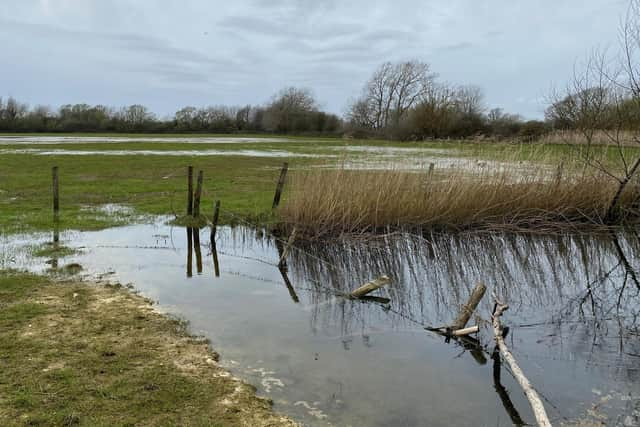Sussex farmers struggling after one of the wettest winters in decades
and live on Freeview channel 276
As spring blooms and lambing continues across the UK, many acres of prime food-producing land remain submerged or waterlogged, following months of relentless rainfall and the wettest 12-month period in 150 years.
February was the fourth wettest since records began in 1871 in England, with a rainfall total of 130mm representing 225% of the 1961 to 1990 long-term average, and there have been 10 named storms in recent months.
Advertisement
Hide AdAdvertisement
Hide AdMost of the losses are uninsurable, and the government recently opened a scheme for farmers offering grants of up to £25,000, through the Farming Recovery Fund. But it only applies to Storm Henk-related damage and in certain counties – and Sussex has been left out.


The Country Land and Business Association (CLA) represents farmers, landowners and rural businesses across Sussex.
Regional director Tim Bamford said: “The fund is welcome but the government must widen the eligibility and be transparent about how it arrived at this criteria to end the confusion and uncertainty.
“The impact of flooding on farm businesses is profound, damaging infrastructure such as fencing and walls, contaminating soil and jeopardising environmental projects. Crops and livestock have been badly affected, and any reduction in domestic food production may lead to an increase in imports and prices.
Advertisement
Hide AdAdvertisement
Hide Ad“Farmers are dynamic and forward-thinking and are used to working with extreme weather, but the last few months have been especially difficult.”
West Sussex arable farmer Keith Langmead has had a large acreage flooded, and says part of the responsibility lies with the Environment Agency for not clearing out the local rife.
Mr Langmead said: “We will have to re-seed about 40 acres and reduce the number of cattle. If the rife had been dug more regularly then the water would have subsided quicker and the grass might have survived.
“Hundreds of acres have been flooded across the Bognor Regis area for much of the winter, making it impossible even to grow grass. I spent £10,000 re-seeding after last winter and most of that has been a waste of money.”
Comment Guidelines
National World encourages reader discussion on our stories. User feedback, insights and back-and-forth exchanges add a rich layer of context to reporting. Please review our Community Guidelines before commenting.